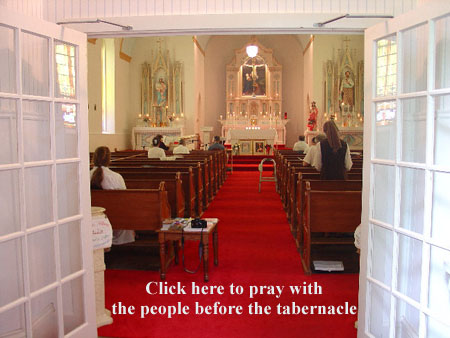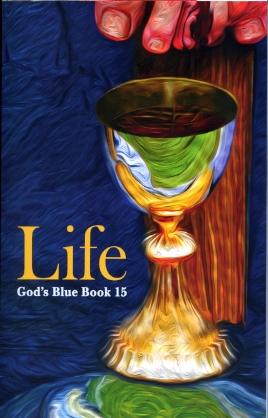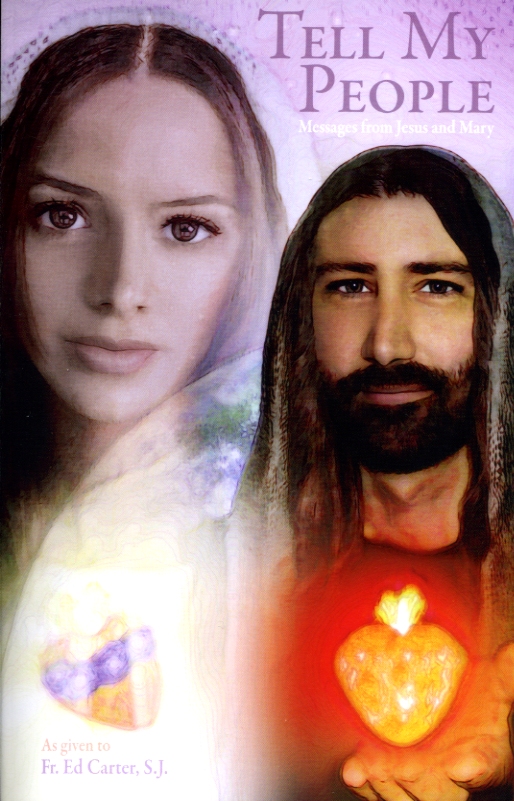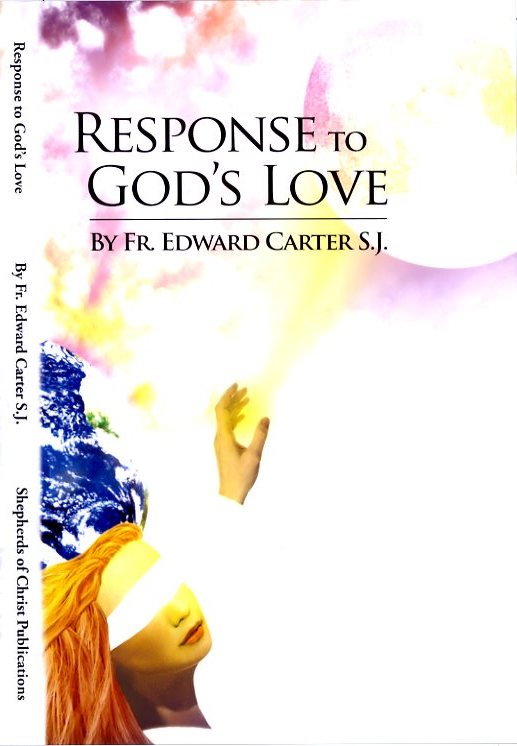| Shepherds of Christ Daily Writing |
 |
October 23, 2015
|
October 24th Holy Spirit Novena |
The Novena Rosary
Mysteries |
Pray for special intentions.
Pray for Dan & Melanie, Jimmy,
Fr. Joe, Sonny & family, Blue Book 16.
Please pray for funds & grace.
Give the gift that Counts.
Blow Out Sale for Reprinting of Blue Book 1, 2 & 3



While Supplies Last
Blue Book 1 - $4 each plus postage
Blue Book 2 - $4 each plus postage
Blue Book 3 - $3 each plus postageCall 1-888-211-3041 for Doris

Blue Book 15 Available
Introductory Price $5.00 plus postage
October 23, 2015 - 4:00 am
R. Resistance to the will of God
God has a Plan, but man has
a free will – to obey Him and try
to change bad habits, dysfunction,
to grow in holiness.
Mary spoke at Fatima of Conversion.
Is it any wonder when God, the Master,
created us and gave us a free will
to do what we choose and many
parade before God in defiance
and disobedience to His will,
they act like God doesn't exist or
they act like God doesn't see - their
unloving, unjust ways.
Confession is a sacrament God gives
us, but we are to examine our
conscience and with a firm purpose
of amendment, not want to sin
again.
Vice or Virtue
We have a choice to cling to deadly
sins, pride, anger, lust, jealousy,
envy, gluttony, slothfulness –
or to try to live a virtuous life –
praying to God to give the grace
to live virtuously.
The 7 main virtues are faith,
hope, love, justice, prudence,
temperance and fortitude.
The gifts of the Holy Spirit help deepen
these virtues in our soul.
The gift of the fear of the Lord
helps the person to have the desire
to avoid the smallest sin against
God and neighbor.
The gift of fear of the Lord helps
the person see themselves as
a little child under God.
A person who is prideful makes
themselves their god – seeking
dominance for dominance sake –
seeking INDEPENDENCE, putting
themselves above others. They
want to be the ruler and they can
live their whole life – not seeking
change in their erratic behavior –
but becoming more adapt to
trying to force others in relationships
to put up with their arrogant
ways and dysfunction.
I think in the magnificat –
Luke 1: 52
He has pulled down princes
from their thrones
and raised high the lowly.
R. Seeing oneself always - every
minute, every hour as a little
child under God – dependent on
God is a far cry from one who
parades arrogantly before God
like He doesn't exist or is not
all seeing and all knowing and
the man is living his life in rebellion
to God's will, planning, prodding,
putting people on his schedule,
amid forcing before God his will
in dysfunction, in unloving ways
and offending God and neighbor
with his INDEPENDENCE –
like Eve in the Garden.
Piety completes the virtue
of justice. We see God as our
Heavenly Father, we see our
brothers as children of God and
we sacrifice to serve others –
Jesus showed us sacrificing for us –
as head of the Mystical Body the Church,
we know we as members of the
mystical body of Christ are to
live His life, death and resurrection
in our lives. It is a response to
God's unfathomable love for us,
to not want to offend Him or our
neighbor and through the grace
from the Holy Spirit to be so attuned
to this way – the way of Christ –
to meditate on His self-giving of
emptying Himself for us.
A woman carrying a baby
gives of herself to carry a child –
She gives of herself in giving
milk, if she is breastfeeding,
after the baby is born.
The incarnation is such
a mystery – that the Divine,
Almighty, Son of God, took flesh
and came to this earth a baby
and died and rose and ascended
into heaven. That Jesus gave His
flesh and blood for our sins –
Sacrifice – God calls us to
sacrifice – not to be independent
and selfish and self-centered,
planning and prodding so we
can try to force others into
our image and likeness, when
we haven't even tried to live
virtuously, man can live his
life, under God – not acting like
he is under God at all –
Discipline is necessary to
sacrifice oneself in learning to
love and get along, to help
build the Kingdom of God.
Or man can live a life of
his planning and prodding, of
his resisting the real thing that
counts growing in the image
and likeness of Jesus.
Genesis 1: 26-27
God said, ‘Let us make man in our own image, in the likeness of ourselves, and let them be masters of the fish of the sea, the birds of heaven, the cattle, all the wild animals and all the creatures that creep along the ground.’
God created man in the image of himself,
in the image of God he created him,
male and female he created them.
R. Yes the Plan of God is ordered –
It has a marvelous, mysterious
union that permeates heart
and soul and can open up
a door to God dwelling more or
more abundantly, always,
in our hearts.
The man, having been baptized,
praying for the increase
in faith, hope and love and the
other virtues knows the
scriptures of living this
dependence on God, desire
to be childlike, submissiveness,
living one's life to grow more
and more in full Christian
maturity in the image and likeness
of God.
Matthew 11: 25
At that time Jesus exclaimed, 'I bless you, Father, Lord of heaven and earth, for hiding these things from the learned and the clever and revealing them to little children.
R.
Man can do work and try
to treat this work in helping to
renew the Church and the world
like his job and people
should obey him, while he
sits around and thinks what
he can do in his position –
How sterile and offending is
this when in justice we are
to leave others a better
world – having lived, as Christ
lived, in us and loved even
the generation coming up.
With God's grace and His Might
we can help the world to be
formed more and more in
the Christic image God
intends it to be –
The Church, the world and
the individual Christian are
in the state of becoming more
and more Christic, in this
image of Christ – God enlists
our help – to be in our uniqueness
what God wants us to contribute
to the love in the world.
God has a plan for our life –
Why would man rebel, like
Adam and Eve in the Garden,
living deadly sins and living
his whole life in this
independence where he makes
himself his own little god
and parades it before God
like He isn't watching –
The gift of wisdom is the highest
of the gifts of the Holy Spirit – the soul
sees God first and in all they
choose to the end.
The prideful man, doesn't
see through the eyes of God –
he just keeps seeing his plan
and with bad habits tries
to force his way always to the
top – even when God, and
authority is over him. A
nervous spirit, commotion,
negative behavior, stepping
on heads while he clamors,
stepping on whoever, like they
aren't there to pad his ego
and toot his own horn as he
raises himself up and puts
others down, discrediting others
and seeing himself king of
every mountain.
Pride is a far cry from
charity, from sacrifice, from
giving, as Christ did when He
showed us the suffering servant
Christ sacrificed His body and blood –
In Genesis we see the quote
about child bearing – a woman
carries a baby, formed from
themselves and delivers the baby
in pain – she gives a part of
herself for her baby – sacrifice
and love –
bone of my bone
flesh of my flesh
baby born from her womb
A religious is to forgo many sacrifices
in helping the birthing of the
mystical body of Christ, to
be a witness of Christ, alive
in them, operating in the
world, a servant of God,
a child of God the Father,
an instrument in which the
Holy Spirit can operate to bring the
world - the fire of God's love.
A man who is self-centered, selfish,
self-promoting, angry,
prideful, living a single
life – paving this path –
is a paradox to the suffering
servant, Jesus shows us
in His life, death and
resurrection.
People in the consecrated life are
to be in obedience to a
superior, this is vital –
so a man or woman cannot
force their bad behavior in
an order, live independently
and like a single ruler,
disobeying the whole
charisma for why the order
exists as given to the Founders
from God.
The Holy Spirit came upon the Apostles
at Pentecost and they went
out fearlessly to build up
the Church.
The docility is seen in Peter,
for all the times he was corrected
by Jesus and listened to Him
and obeyed Him.
We see docility and love in
Mother Teresa and St. Therese
the little flower whose marriage
was to Jesus – her heart so full
of love for Jesus, her precious
Spouse.
What good does it do a
man to win the whole world
and lose his soul?
Trusting those in authority, even
though they are imperfect men,
has been the way the Church
grew. Leaders are to be
more and more in the image
and likeness of Christ.
The Virtues of faith, hope and love are
given at baptism. We must pray
for grace to see through
the eyes of God, to hope
for ourselves and others and
to love with the Heart of Jesus.
We are called to love –
We are to grow to be perfected as
our Heavenly Father is
perfected –
A person can shut down and
demand people around them
serve their vision – so
they don't have to change –
They are far from what God
is calling for with their life.
To be like Christ – we see He
died for our sins – We are
to die to our bad behavior –
we are to be like little
children of God the Father –
We are to see the body of Christ
and work as members, in
union with the other
members to raise up
the Church to be that
leaven in the world – to
help lift a troubled
world – crying out and
bleeding in pain –
To do manual tasks and ignore
the spiritual change
needed to be virtuous,
to live a holy life can
do damage to those watching
us calling ourselves
Christians and being
Independent – making ourselves
equal to God.
From the Priestly Newsletter Book III - 2000 Issue 3 p. 44-45
The Father's Will for Us - Our Source of Peace
Pope John Paul II instructs us: "The Church, as a reconciled and reconciling community, cannot forget that at the source of her gift and mission of reconciliation is the initiative, full of compassionate love and mercy, of that God who is love (see 1 John 4:8) and who out of love created human beings (see Wisdom 11:23-26; Genesis 1:27: Psalms 8:4-8)…He created them so that they might live in friendship with Him and in communion with one another.
"God is faithful to His eternal plan even when man, under the impulse of the evil one (see Wisdom 2:24) and carried away by his own pride, abuses the freedom given to him in order to love and generously seek what is good, and (instead) refuses to obey his Lord and Father. God is faithful even when man, instead of responding with love to God’s love, opposes Him and treats Him like a rival, deluding himself and relying on his own power, with the resulting break of relationship with the One who created him. In spite of this transgression on man’s part, God remains faithful in love.
"It is certainly true that the story of the Garden of Eden makes us think about the tragic consequences of rejecting the Father, which becomes evident in man’s inner disorder and in the breakdown of harmony between man and woman, brother and brother (see Genesis 3:12 ff; 4:1-16). Also significant is the Gospel parable of the two brothers (the parable of the ‘prodigal son’; see Luke 15:11-32) who, in different ways, distance themselves from their father and cause a rift between them. Refusal of God’s fatherly love and of His loving gifts is always at the root of humanity’s divisions.
"But we know that God…like the father in the parable (of the prodigal son), does not close His heart to any of His children. He waits for them, looks for them, goes to meet them at the place where the refusal of communion imprisons them in isolation and division. He calls them to gather about His table in the joy of the feast of forgiveness and reconciliation.
"This initiative on God’s part is made concrete and manifest in the redemptive act of Christ, which radiates through the world by means of the ministry of the Church." 13
___________
13. Pope John Paul II, as in Celebrate 2000!, Servant Publications, pp. 140-141.
From Response in Christ by Fr. Edward J. Carter, S.J.
The Cross and Christian LifeSEVEN
1. Traditional and Contemporary Views of the Cross (excerpt
)One of the great stresses of contemporary asceticism is to sustain the Christian in his proper involvement with the world according to his particular vocation — we still make allowance of course for the rare vocation of the cloistered contemplative which still calls for withdrawal from the world. Contemporary asceticism is an asceticism which is primarily concerned with a loving service of God through a loving service of this world. It is an asceticism which enables the Christian to imitate Christ as the "Man for others", a phrase popular with some contemporary thinkers. This Christian dimension of "being for others" has been given a great impetus by the theology of Vatican II. This theology constantly opens up the Church to proper involvement with the world. The Church today, perhaps more so than ever, is conscious that one of the most obvious themes of her life is that of prolonging the witness of Christ, the suffering servant, the man for others.
All in all, the contemporary view of the Christian cross marks progress. It is more complete. It recognizes that we must be united to God not only as He is in Himself, but as He has incarnated Himself in this world. If this contemporary view of the cross is to be authentic, however, it must also incorporate those values of the previous asceticism which are still necessary. There can be no complete break with the past. Christianity is an evolving life, and as with all life, it can never completely dispense with its past. Also, the contemporary view of ascetism is open to its own peculiar dangers, just as was the traditional asceticism. We will try to point out some of these dangers as we now briefly discuss various forms of our participation in the death of Christ. In the divisions which follow, clear-cut distinctions are not intended. For instance, an act of renunciation can also be an act of penance, but not necessarily so. The objective of the divisions is to point out that there are various forms of sharing in Christ's death, each with its own particular purpose; yet all forms ultimately share the common purpose of assimilating us more closely to the death of Christ so that we might share here and hereafter more fully in His Resurrection. As we thus participate more fully in Christ's death-resurrection, we are also more capable of leading others to a similar participation.
2. Various Forms of the Cross
a) Christian Self-discipline
In this section we will discuss topics which have traditionally been treated under the term mortification. We have chosen the term self-discipline because it perhaps is more acceptable and meaningful to the contemporary Christian.
All forms of life demand self-discipline. The athlete has to subject himself to a rigorous training. The scholar has to discipline himself and make many sacrifices if he is to achieve significant academic success. The musician has to endure long hours of practice. The doctor has to be willing to order his life to the rigorous demands of the medical profession.
The Christian life, too, has its own form of discipline or control. This discipline has for its comprehensive purpose the greater assimilation of the Christian's total being to Christ. Christian self-discipline allows for the proper development of the Christ-life in all its dimensions. Like all forms of authentic discipline, it is at the service of life. When it is properly exercised, Christian self-discipline helps us to grow in our capacity to love God and man. It helps us render in Christ a more meaningful life of service to the Father and men.
This proper, grace-inspired control over our complete person is necessary because our various sense and spiritual faculties do not automatically follow the lead of grace. Because of original and personal sin, there are various tendencies within us which, if not properly controlled, will lead us away from Christ and the proper development of our grace-life. One of the dangers of an extreme or not completely authentic incarnational spirituality — an aberration of which contemporary Christians must be aware — is that it is falsely optimistic. It does not sufficiently allow for this sinful element in man. The Christian must be willing to exercise a reasonable self-discipline despite the considerable pain which can at times be involved. And this control must extend to all his faculties.
As regards our intellectual lives, there are various tendencies inimical to our Christ-life which must be disciplined. For instance, there can be a laziness which prevents a proper pursuit of study which is necessary for the Christian life in general and for our own particular role in the Church. There can be an unwholesome curiosity which leads us to know that which is more pleasing, rather than first of all to know that which is necessary. There is an intellectual pride which can manifest itself in various ways. Some people find it extremely difficult to be open to the ideas of others, or to admit their mistakes. The most serious form of intellectual pride, of course, is that which can cause the loss of faith, a pride which prevents the person from any longer submitting to God's revelation.
The Christian's will, the decisive faculty in man, must receive special attention. It must become both supple and strong. It must be supple in order to be open to the varied movements of the Holy Spirit. The will, under grace, must also have the strength to guide the whole man, including those forces which can so powerfully at times lead away from God. As far as concrete decision-making is concerned, there are two extremes which we must avoid. On the one hand, we must avoid precipitous action which is devoid of reflection. This reflection is rooted in an appropriate openness to the movements of grace. On the other hand, we must not fall prey to the habit of indecision. Some people are prone to spend much too long in making decisions over the simplest matters. Life is short, and we must train ourselves to make decisions after appropriate reflection. In many of our ordinary actions and decisions this reflection is instantaneous. Unhealthy fear and other factors which are responsible for indecision must be curbed despite the even great pain this can cause at times for certain temperaments.
The Christian's remaining interior faculties, those of memory and imagination must also be subjected to proper discipline. These two faculties can be of great value when properly guided. If they are not properly controlled, they can, in their unruliness, become great obstacles to the proper exercise of the Christian life. An undisciplined memory and imagination can seriously interfere with our prayer life. A memory and imagination which are not properly controlled can also give rise to numerous temptations against purity, charity and the other virtues.
Man's emotional nature must also be properly regulated under grace. A considerable portion of past spiritual literature has not given due allowance to the role which God intends the emotions to exercise. Therefore, when we speak of control of the emotions, we by no means are suggesting repression or an inhuman rigidity. Rather we speak of a control which permits the emotions to contribute to the richness and overall value of the Christian's actions. St. Thomas teaches that the emotions or passions, when properly integrated with the movements of the intellect and will, add to the goodness of our acts. 4
However, as is obvious, the evil tendencies of the emotions must be properly disciplined if they are to add their positive contribution to the Christian life. The emotions can cause havoc if such a discipline is lacking. They can reduce man to an almost brute existence at times, or they can so constrict a person as to interfere seriously with the proper exercise and development of his Christ-life. In this regard it should be observed that the emotion of fear, if not properly controlled, can cause serious disorders. Psychiatrists and psychologists tell us that an uncontrolled and morbid fear is one of the chief causes of emotional and mental illness.
At the mention of emotional and mental illness we should digress somewhat and ask ourselves this important question: Do such disturbances interfere with growth in holiness? Not all theologians would agree in their answer. The better opinion seems to be that which would make a distinction between two basic kinds of holiness.5 There is a total holiness, one which manifests itself throughout the entire being. Heroic holiness of this type is the kind which the Church presently demands for canonization. There is another kind of holiness which does not manifest itself in every area of a person's being. This is the type of holiness which is compatible with even severe emotional and mental illness. Persons thus burdened must take the reasonable means to cure or control such afflictions, and strive to live the Christian life as well as their condition allows. If this is done, they can be sure they are pleasing to God, that holiness is possible for them, and that they too can make their own contribution to the life of the Church.
We now return to the topic of Christian self-discipline. We have discussed the control of the intellect, will, memory, imagination and emotions. There remains a final part of one's being, bodily nature. The body is holy, partaking in the holiness of Christ's body. But it is not yet completely redeemed. It can be subject to numerous evil tendencies, which, if not controlled, can weaken the life of sanctifying grace and even destroy it. The great saints did not excuse themselves from a proper vigilance of the body with its various senses. Neither can we. St. Paul says, "All the runners at the stadium are trying to win, but only one of them gets the prize. You must run in the same way, meaning to win. All the fighters at the games go into strict training; they do this just to win a wreath that will wither away, but we do it for a wreath that will never wither. That is how I run, intent on winning; that is how I fight, not beating the air. I treat my body hard and make it obey me, for, having been an announcer myself, I should not want to be disqualified." (1 Co 9:24-27).
b) Penance
Christian self-discipline or mortification, then, looks to a proper control of one's total being. This control is necessary for the avoidance of sin and the proper functioning of the life of grace. There is another form of the cross which some people confuse with the self-discipline we have just discussed. The form of the cross we speak of is that of penance.
Christian penance does not have the same basic purpose as self-discipline. Christian self-discipline looks rather to the proper living of the Christian life in the present and future, whereas penance looks to the sinful past. Penance, therefore, is a virtue which includes a sorrow for sin, a purpose of amendment, and a desire to make atonement or satisfaction for sin. As with the entire Christian life, penance is primarily, although not exclusively, an interior attitude.6
Penance, or satisfaction for sin, is an essential part of the life of the Church and the individual Christian because both are called upon to continue Christ's redemptive Incarnation. One aspect of Christ's redemptive work consisted in making satisfaction for sin. This aspect of Christ's life should always be part of the Church's existence and that of the individual Christian. Furthermore, certain members of the Church are called to give special attention to the prolongation of Christ making satisfaction for sin. In this category are those who are called to a form of religious life primarily dedicated to making reparation for sin.
4. St. Thomas Aquinas, S.T., I-II, q. 24, a. 3.
5. Cf. P. Fransen, Divine Grace and Man (New York: New American Library, 1965), pp. 202-204.
6. Cf. R. Schnackenburg, The Moral Teaching of the New Testament (New York: Herder & Herder, 1967), p. 26.
end of excerpt
R. Gifts of Holy Spirit
Knowledge - a supernatural grasping
of truths of God –
also the truth about oneself –
helps us see good or malice
in our motives –
helps us discern secret
motives
helps us see effects
of our actions
We see God's providence
See through God's eyes –
A person turns all their
things to God – operating
in goodness
Counsel – The Holy Spirit helps us to know in
the uncertainties in our lives
what to do –
prudence
concerned about the right
time and the right place
To go to the Holy Spirit for decisions
in our lives
Fortitude – completes the virtue
of fortitude –
courage to do what is
necessary to do God's will –
Piety – completes virtue of
justice –
We see God the Father as our Heavenly
Father –
We see our brothers as children of God –
We sacrifice to serve others –
Fear of the Lord
habitual love of God –
seeing oneself as a little child
under God –
A soul is submissive to God's will.
The desire is there to avoid
the smallest sin –
Wisdom – is the highest gift of the Holy Spirit –
The soul sees God first
and in all they choose
to the end.
Fruits
Charity – burning and constant love of
God and neighbor
Joy – A spiritual joy
Peace – calmness despite adversity
Patience –
Benignity – goodness
love of serving others
Faith – being faithful to God
being faithful to God's will
faithfulness to love of God and neighbor
Mildness – not combatal (argumentative)
not prideful
meekness in what a person does
Modesty – being chaste

Give the gift that keeps giving.
6 different Blue Books for $30.00 including postage
|
|
|
|
|
|
|
|
|
|
|
|
|
|
|
|
|
|


Books available in limited supply for this sale.
The more you use the Blue Books and
become one with Jesus – more
intimate with Jesus –
the more your lives are a blessing and
everything you do in life can help
to bring down great grace for the world
because of your being so
one with Jesus.
Guiding Light Homily Book Series
Fr. Joe’s Books
|
|
|
|
|
4 for $20 plus postage of $5.95
These books can be given to:
1) All Priests
2) Good for Music Ministers
3) Good for DRE's
4)
Good for Deacons
5) Good
for Principals of Schools
6) Good for Teachers
7)
Good for Mom and Dads
Given March 21, 2014
R. Pray for These Things
1) Pray for the Pope & hierarchy to help us start prayer chapters.
2) Pray for Dan, Sally Jo, Richard, Carol, Margaret, Sue,
Jack, Jean, Amanda, Matthew, Special intentions.
3) Pray for the priests, the Church and the world!
4) Pray for the spread of prayer chapters,
also for the spread of priests doing prayer chapters.
5) Pray for the spread of Blue Books.
6) People going to Florida and China.
7) Vocations to all 7 categories.
8) Pray for spread of Consecration and Rosary.
9) Pray for pope helping us.
10) Pray for Jeff - sales & health. Pray for Nick.
11) Blue Book 16 and cover and all involved.
For our Publisher and all involved
12) All intentions on my list, Jerry's list.
13) Priests getting Fr. Joe's book.
14) Pray for Fr. Joe's new book, cover & funds for printing & postage.
15) Donors and members and their families.
16) Healing of the Family tree.
17) Dan & Melanie, Catherine & mom, Gary, Mary Jo,
Jim & statues, Fr. Ken, Monsignor, Kerry, Tom & wife.
18) All who asked us to pray for them.
19) All we promised to pray for.
20) Rita, John, Doris, Sheila, Jerry, Regina, Sanja,
Betty, Sophie, Lisa, Eileen, Fr. Mike, Louie, Laverne,
2 Dons, Mary Ellen, Fr. Joe, all priests helping us,
Ed, Jimmy, Steve, a special couple, Rosie & all involved.
21) 2 babies and moms.
22) Funds and insurance.
23) Jerry's garage.
24) In thanksgiving for gifts, graces, & blessings received.
25) Spread the Blood of Jesus on all of us here.
26) Consecrate all hearts.
27) Cast the devil out of all of us here and all in Movement.
The Wedding Rosary
Crystal Image Rosary
$40 plus shipping
Original Image Rosary
8mm glass beads
in a matching gift box$40 plus shipping
Give the gift that counts.
Give to your priests Fr. Carter's Books plus postage.
Tell My People $5.00
Response to God's Love $8.00
Response in Christ $8.00


Old Mass Books with the Imprimatur
$2.00 plus postage
New Mass Book with Imprimatur
$8.00 plus postage
New Parents & Children's Book with the Imprimatur
$8.00 plus postage
Fr. Joe's Cycle A – Steadfast to the Sun – Starts in Advent
$5.00 plus postage
Give the gift that keeps on giving!
Give to your priest.
Fr. Carter's Priestly Newsletters Book II
$6.00 plus postage
Get a canvas print of Mary's image
with a sliver of glass and a little
bottle of Jesus and Mary water.
The glass will be fixed behind the
back of the picture.
$200.00 plus postage
Shepherds of Christ Ministries
P.O. Box 627 China, Indiana 47250
Telephone: (toll free) 1-888-211-3041 or (812) 273-8405
FAX: (812) 273-3182